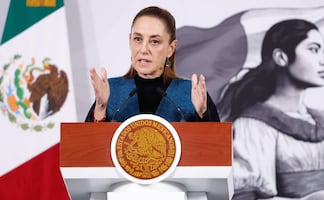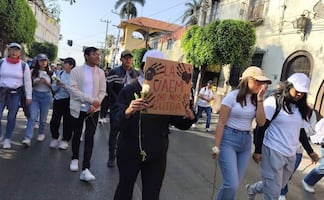Más Información

Cónsul Honorario de Filipinas es socio de empresa vinculada al CJNG; inmobiliaria fue sancionada por EU

Sheinbaum: Ya vamos a presentar la información de personas desaparecidas; va contra reclutamientos forzados de la delincuencia

Kershenobich: Trasplantes de órganos dejan de ser “heroicos”; destaca consolidación del proceso quirúrgico en el sistema de salud

Corte ordena a Hacienda pago de 103 mdp a Televisa por “impuestos indebidos”; Batres pide no desechar el asunto

Universitarios marchan en Morelos por desaparición de Kimberly Jocelyn; fiscalía investiga cuerpo hallado
Turkish authorities rounded up nearly 3,000 suspected military plotters on Saturday and ordered thousands of judges detained after thwarting a coup by rebels using tanks and attack helicopters to try to topple President Tayyip Erdogan.
For several hours overnight on Friday violence shook Turkey's two main cities, as the armed faction which tried to seize power blocked a bridge in Istanbul and strafed the headquarters of Turkish intelligence and parliament in Ankara.
At least 265 people were killed. An official said 161 of them were mostly civilians and police officers, while the remaining 104 were coup supporters.
But the coup attempt crumbled as Erdogan rushed back to Istanbul from a Mediterranean holiday and urged people to take to the streets to support his government against plotters he accused of trying to kill him.
"They will pay a heavy price for this," said Erdogan, launching a purge of the armed forces, which last used force to stage a successful coup more than 30 years ago. "This uprising is a gift from God to us because this will be a reason to cleanse our army."
Among those detained were top military commanders, including the head of the Second Army which protects the country's borders with Syria, Iraq, and Iran, state-run Anadolu news agency said.
Hundreds of soldiers were held in Ankara for alleged involvement in the coup, leaving police stations overflowing.
Some had to be taken under armed police escort in buses to a sports stadium. Reuters footage showed some of the detainees, handcuffed and stripped from the waist up, sitting on the floor of one of the buses.
The government declared the situation under control, saying 2,839 people had been rounded up, from foot soldiers to senior officers, including those who formed "the backbone" of the rebellion.
Authorities also began a major crackdown in the judiciary over suspected links to U.S.-based cleric Fethullah Gulen, removing from their posts and ordering the detention of nearly 3,000 prosecutors and judges, including from top courts.
Erdogan has blamed the coup on supporters of Gulen, who he has frequently accused of trying to foment uprising in the military, media and judiciary.
Ten members of the High Council of Judges and Prosecutors and two members of the Constitutional Court have already been detained, officials said.
A successful overthrow of Erdogan, who has ruled the country of about 80 million people since 2003, would have marked another seismic shift in the Middle East, five years after the Arab uprisings erupted and plunged Turkey's southern neighbor Syria into civil war.
However, a failed coup attempt could still destabilize the NATO member and major U.S. ally that lies between the European Union and the chaos of Syria, with Islamic State bombers targeting Turkish cities and the government also at war with Kurdish separatists.
U.S. President Barack Obama expressed support for Turkey's government and called on all sides to avoid action that would lead to further violence or instability.
French President Francois Hollande said he expected a period of repression in the aftermath of the failed coup.
Erdogan, who had been holidaying on the southwest coast when the coup was launched, flew into Istanbul before dawn on Saturday and told thousands of flag-waving supporters at the airport that the government remained at the helm.
A polarizing figure whose Islamist-rooted ideology lies at odds with supporters of modern Turkey's secular principles, Erdogan said the plotters had tried to attack him in the resort town of Marmaris.
Erdogan's AK Party has long had strained relations with the military, which has a history of mounting coups to defend secularism although it has not seized power directly since 1980.
He commands the admiration and loyalty of millions of Turks, however, particularly for raising living standards and restoring order to an economy once beset by regular crises, which grew 4.8 percent year-on-year in the first quarter.
The violence is likely to hit a tourism industry already suffering from the bombings, and business confidence is also vulnerable.
Noticias según tus intereses
[Publicidad]
[Publicidad]









